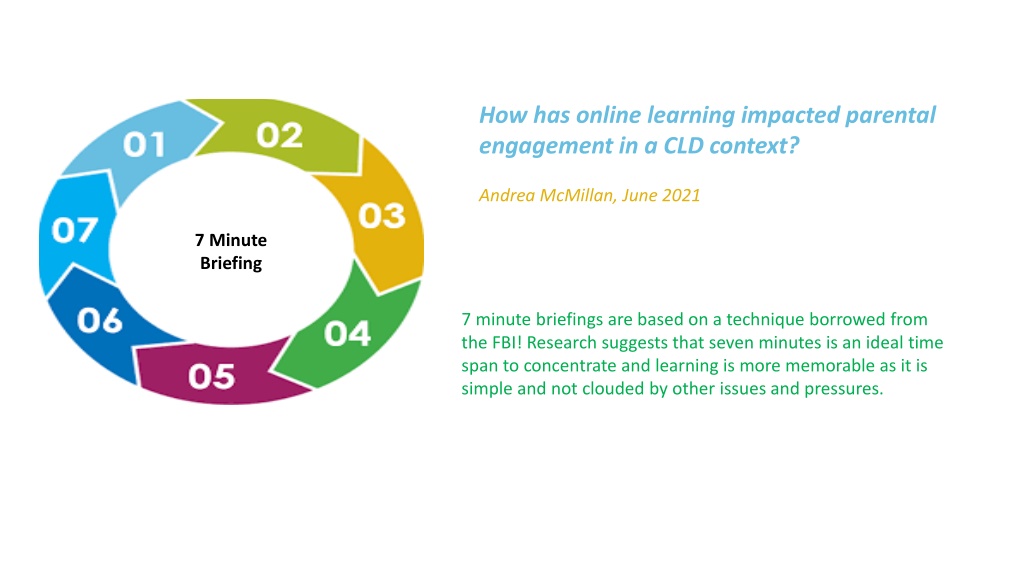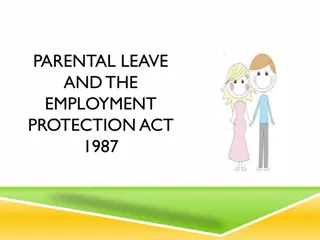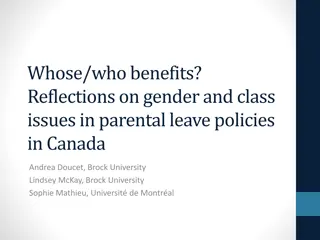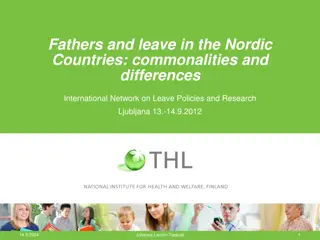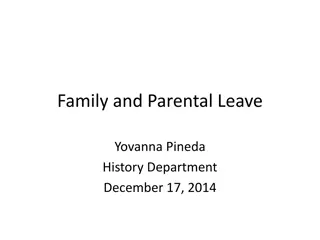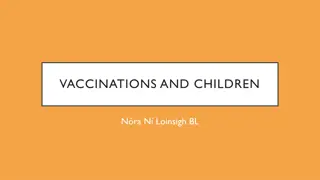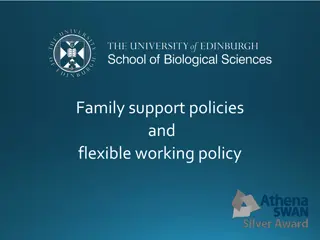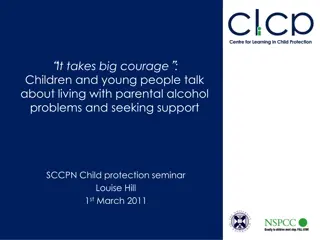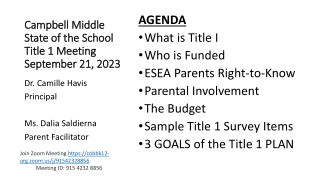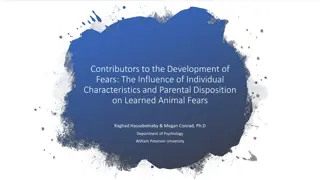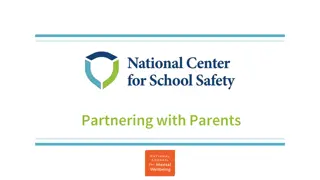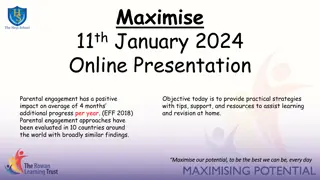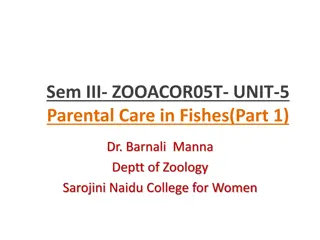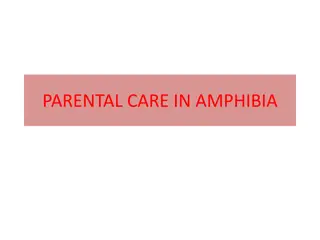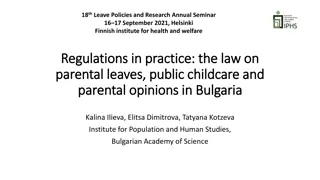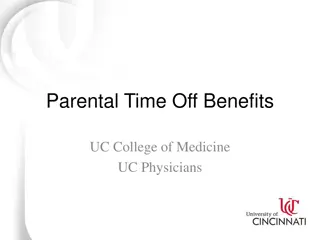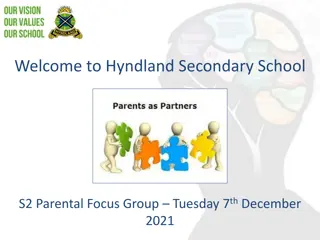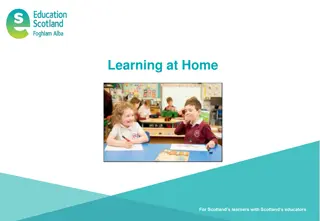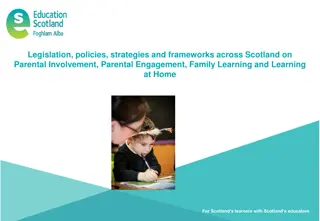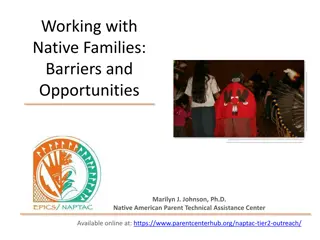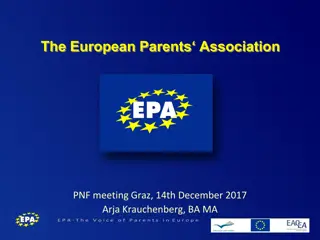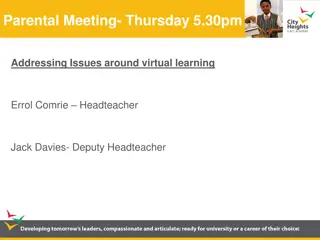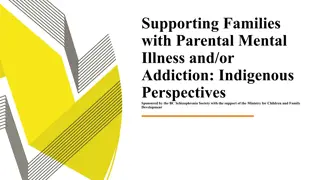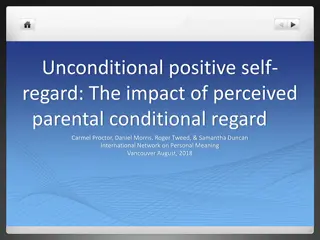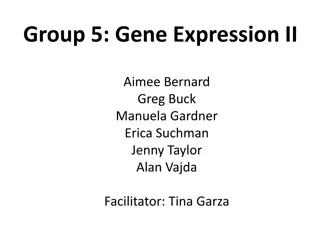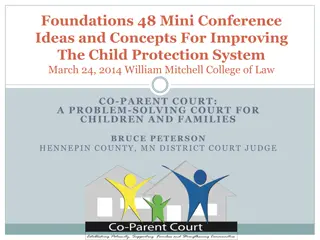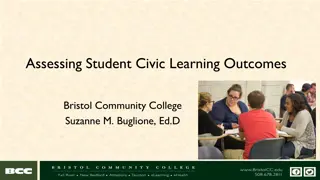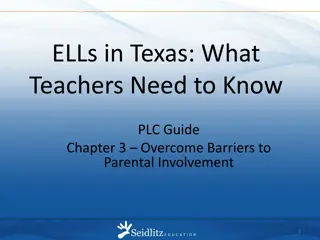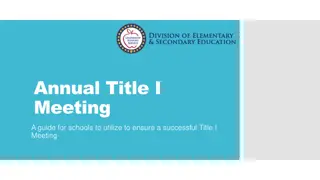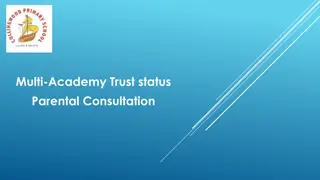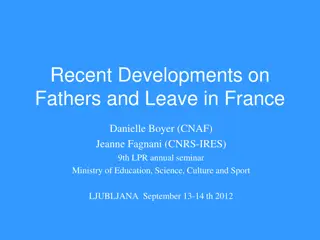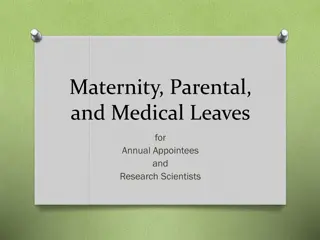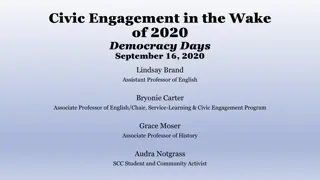Impact of Online Learning on Parental Engagement in CLD Context
The global pandemic in 2020 led to the closure of schools, shifting learning to online platforms. This study explores how online learning has affected parental engagement in Culturally and Linguistically Diverse (CLD) contexts. Family Learning, distinct from homeschooling, plays a crucial role in engaging families in educational outcomes. Research indicates that family learning positively impacts not just children's outcomes but also enhances parents' learning and employability opportunities, leading to economic benefits for the family. The shift to online learning has implications for the future of Family Learning and CLD education.
Download Presentation

Please find below an Image/Link to download the presentation.
The content on the website is provided AS IS for your information and personal use only. It may not be sold, licensed, or shared on other websites without obtaining consent from the author. Download presentation by click this link. If you encounter any issues during the download, it is possible that the publisher has removed the file from their server.
E N D
Presentation Transcript
How has online learning impacted parental engagement in a CLD context? Andrea McMillan, June 2021 7 Minute Briefing 7 minute briefings are based on a technique borrowed from the FBI! Research suggests that seven minutes is an ideal time span to concentrate and learning is more memorable as it is simple and not clouded by other issues and pressures.
1.Introduction -In 2020, the global pandemic forced the closure of the world s schools and forever changed the learning landscape. In this review I have explored the research on the impact of home- schooling and how this has impacted parental engagement. I ll consider some points on what this means for Family Learning and CLD in the future. But first I d like to present one parent s view
One parents pain! https://www.youtube.com/watch?v=H7_wvQHMGOI
1.Introduction -In 2020, the global pandemic forced the closure of the world s schools and forever changed the learning landscape. In this review I have explored the research on the impact of home- schooling and how this has impacted parental engagement. I ll consider some points on what this means for Family Learning and CLD in the future. But first I d like to present one parent s view 2. What is Family Learning - Family Learning is not home-schooling! Family learningis an approach to engaging families in learningoutcomes that have an impact on the whole family. (Education Scotland). There is a wealth of evidence and research that shows that family learning is effective A longitudinal study in Turkey showed that the outcomes for children included access to university and higher salaries in later life. (Learning and Work, 2013). Family Learning, supports better outcomes for the young person but also positively impacts on the learning and employability opportunities for parents, which has a contributory economic benefit for the family. In Glasgow our FLO Team are tracking parent s progress from attending, for example a cooking class, to volunteering, to employment.
1.Introduction -In 2020, the global pandemic forced the closure of the world s schools and forever changed the learning landscape. In this review I have explored the research on the impact of home- schooling and how this has impacted parental engagement. I ll consider some points on what this means for Family Learning and CLD in the future. But first I d like to present one parent s view 2. What is Family Learning - Family Learning is not home-schooling! Family learningis an approach to engaging families in learningoutcomes that have an impact on the whole family. (Education Scotland). There is a wealth of evidence and research that shows that family learning is effective A longitudinal study in Turkey showed that the outcomes for children included access to university and higher salaries in later life. (Learning and Work, 2013). Family Learning, supports better outcomes for the young person but also positively impacts on the learning and employability opportunities for parents, which has a contributory economic benefit for the family. In Glasgow our FLO Team are tracking parent s progress from attending, for example a cooking class, to volunteering, to employment. 3.What happened during COVID? - In the midst of the COVID-19 pandemic, 191 countries have implemented countrywide school closures, affecting 1.6 billion learners worldwide1 (UNESCO). As parents began to support home-schooling during the pandemic they were engaged in their children s learning to an extent not seen before. Most of the research has focussed on the impacts on children and young people and some has focussed on parents. I did not find anything that looked at this in the context of family learning. That said there were some support resources for parents that encouraged parents how to build learning into their day e.g. when going shopping and cooking at home. Research is identifying the gaps for the children from the most deprived areas. They were most likely not to have kit and connectivity and were most at risk of not participating in any home-schooling. CLD Teams have been at the heart of engaging with families providing an important link between the school and the home. Many were involved in delivering physical resources to families (sometimes food) and helping access benefits, information and digital devices. A recent survey of CLD practitioners in Glasgow raised the issue that the pandemic responses are seen as CLD Community Development but some people feel that this blurs the lines of what CLD really is.
1.Introduction -In 2020, the global pandemic forced the closure of the world s schools and forever changed the learning landscape. In this review I have explored the research on the impact of home- schooling and how this has impacted parental engagement. I ll consider some points on what this means for Family Learning and CLD in the future. But first I d like to present one parent s view 2. What is Family Learning - Family Learning is not home-schooling! Family learningis an approach to engaging families in learningoutcomes that have an impact on the whole family. (Education Scotland). There is a wealth of evidence and research that shows that family learning is effective A longitudinal study in Turkey showed that the outcomes for children included access to university and higher salaries in later life. (Learning and Work, 2013). Family Learning, supports better outcomes for the young person but also positively impacts on the learning and employability opportunities for parents, which has a contributory economic benefit for the family. In Glasgow our FLO Team are tracking parent s progress from attending, for example a cooking class, to volunteering, to employment. 3.What happened during COVID? - In the midst of the COVID-19 pandemic, 191 countries have implemented countrywide school closures, affecting 1.6 billion learners worldwide1 (UNESCO). As parents began to support home-schooling during the pandemic they were engaged in their children s learning to an extent not seen before. Most of the research has focussed on the impacts on children and young people and some has focussed on parents. I did not find anything that looked at this in the context of family learning. That said there were some support resources for parents that encouraged parents how to build learning into their day e.g. when going shopping and cooking at home. Research is identifying the gaps for the children from the most deprived areas. They were most likely not to have kit and connectivity and were most at risk of not participating in any home-schooling. CLD Teams have been at the heart of engaging with families providing an important link between the school and the home. Many were involved in delivering physical resources to families (sometimes food) and helping access benefits, information and digital devices. A recent survey of CLD practitioners in Glasgow raised the issue that the pandemic responses are seen as CLD Community Development but some people feel that this blurs the lines of what CLD really is. 4. What is the evidence telling us about children s learning? The picture is mixed. Some young people coped well with online learning whereas some did not engage at all and are at risk from learning loss. . Parental attitudes to learning are important to help motivate young people, however, unfortunately parents tend to underestimate the motivational effect they can have on students to engage in learning activities. Some studies look at children s outcomes against the level of education of the mother. The higher the level of education, the better the outcomes for the child/young person. Access to physical resources was also noted in an international study by Unicef. Among families in the poorest quintile, 29 per cent of children with someone reading books to them achieve foundational reading skills, compared to only 15 per cent of children to whom nobody reads books.
1.Introduction -In 2020, the global pandemic forced the closure of the world s schools and forever changed the learning landscape. In this review I have explored the research on the impact of home- schooling and how this has impacted parental engagement. I ll consider some points on what this means for Family Learning and CLD in the future. But first I d like to present one parent s view 2. What is Family Learning - Family Learning is not home-schooling! Family learningis an approach to engaging families in learningoutcomes that have an impact on the whole family. (Education Scotland). There is a wealth of evidence and research that shows that family learning is effective A longitudinal study in Turkey showed that the outcomes for children included access to university and higher salaries in later life. (Learning and Work, 2013). Family Learning, supports better outcomes for the young person but also positively impacts on the learning and employability opportunities for parents, which has a contributory economic benefit for the family. In Glasgow our FLO Team are tracking parent s progress from attending, for example a cooking class, to volunteering, to employment. 3.What happened during COVID? - In the midst of the COVID-19 pandemic, 191 countries have implemented countrywide school closures, affecting 1.6 billion learners worldwide1 (UNESCO). As parents began to support home-schooling during the pandemic they were engaged in their children s learning to an extent not seen before. Most of the research has focussed on the impacts on children and young people and some has focussed on parents. I did not find anything that looked at this in the context of family learning. That said there were some support resources for parents that encouraged parents how to build learning into their day e.g. when going shopping and cooking at home. Research is identifying the gaps for the children from the most deprived areas. They were most likely not to have kit and connectivity and were most at risk of not participating in any home-schooling. CLD Teams have been at the heart of engaging with families providing an important link between the school and the home. Many were involved in delivering physical resources to families (sometimes food) and helping access benefits, information and digital devices. A recent survey of CLD practitioners in Glasgow raised the issue that the pandemic responses are seen as CLD Community Development but some people feel that this blurs the lines of what CLD really is. 5. What is the evidence telling us about adult/parent engagement? During the pandemic, the relationship between the school/teacher and parents has shifted. Whilst parents remain as the caregivers and supporters of their children s learning, new roles as a proxy for the teacher emerged. In studies with parents, some have felt stressed and overwhelmed. A small minority noted that they didn t experience any impact as their children learned independently at home. The research encourages the building of trusted relationships between parents and schools. Interventions that sit within CLD are suggested e.g. family learning programmes, opportunities to volunteers and having a link member of staff. Understanding each other s stresses and emotional responses to the pandemic was also highlighted. Some studies go as far as to suggest that schools should offer parents training in how to support learning at home and a quick google search brings up lots of resources and You Tube videos aimed at parents. Effectively, this is taking an adult learning/upskilling approach but the focus is on the outcome for the child, rather than the opportunity for the adult. 4. What is the evidence telling us about children s learning? The picture is mixed. Some young people coped well with online learning whereas some did not engage at all and are at risk from learning loss. . Parental attitudes to learning are important to help motivate young people, however, unfortunately parents tend to underestimate the motivational effect they can have on students to engage in learning activities. Some studies look at children s outcomes against the level of education of the mother. The higher the level of education, the better the outcomes for the child/young person. Access to physical resources was also noted in an international study by Unicef. Among families in the poorest quintile, 29 per cent of children with someone reading books to them achieve foundational reading skills, compared to only 15 per cent of children to whom nobody reads books.
1.Introduction -In 2020, the global pandemic forced the closure of the world s schools and forever changed the learning landscape. In this review I have explored the research on the impact of home- schooling and how this has impacted parental engagement. I ll consider some points on what this means for Family Learning and CLD in the future. But first I d like to present one parent s view 2. What is Family Learning - Family Learning is not home-schooling! Family learningis an approach to engaging families in learningoutcomes that have an impact on the whole family. (Education Scotland). There is a wealth of evidence and research that shows that family learning is effective A longitudinal study in Turkey showed that the outcomes for children included access to university and higher salaries in later life. (Learning and Work, 2013). Family Learning, supports better outcomes for the young person but also positively impacts on the learning and employability opportunities for parents, which has a contributory economic benefit for the family. In Glasgow our FLO Team are tracking parent s progress from attending, for example a cooking class, to volunteering, to employment. 3.What happened during COVID? - In the midst of the COVID-19 pandemic, 191 countries have implemented countrywide school closures, affecting 1.6 billion learners worldwide1 (UNESCO). As parents began to support home-schooling during the pandemic they were engaged in their children s learning to an extent not seen before. Most of the research has focussed on the impacts on children and young people and some has focussed on parents. I did not find anything that looked at this in the context of family learning. That said there were some support resources for parents that encouraged parents how to build learning into their day e.g. when going shopping and cooking at home. Research is identifying the gaps for the children from the most deprived areas. They were most likely not to have kit and connectivity and were most at risk of not participating in any home-schooling. CLD Teams have been at the heart of engaging with families providing an important link between the school and the home. Many were involved in delivering physical resources to families (sometimes food) and helping access benefits, information and digital devices. A recent survey of CLD practitioners in Glasgow raised the issue that the pandemic responses are seen as CLD Community Development but some people feel that this blurs the lines of what CLD really is. 6. What lessons can be learned going forward? There is the opportunity to capitalise on the empowerment of parents in their children s learning through a learner-centred CLD approach. Even with recovery and return to face to face learning, there is much to be gained. Trusted relationships are key and take time to build up. It is worth investing in this. More research is required to focus on family learning approaches, post pandemic, linking the home-schooling that was supported with how family learning programmes are carried out in the future. There are lots of examples of this being done online. Physical resources and digital access are paramount to tackling poverty related barriers to learning.Parental attitudes and experience of learning is key to engagement. 5. What is the evidence telling us about adult/parent engagement? During the pandemic, the relationship between the school/teacher and parents has shifted. Whilst parents remain as the caregivers and supporters of their children s learning, new roles as a proxy for the teacher emerged. In studies with parents, some have felt stressed and overwhelmed. A small minority noted that they didn t experience any impact as their children learned independently at home. The research encourages the building of trusted relationships between parents and schools. Interventions that sit within CLD are suggested e.g. family learning programmes, opportunities to volunteers and having a link member of staff. Understanding each other s stresses and emotional responses to the pandemic was also highlighted. Some studies go as far as to suggest that schools should offer parents training in how to support learning at home and a quick google search brings up lots of resources and You Tube videos aimed at parents. Effectively, this is taking an adult learning/upskilling approach but the focus is on the outcome for the child, rather than the opportunity for the adult. 4. What is the evidence telling us about children s learning? The picture is mixed. Some young people coped well with online learning whereas some did not engage at all and are at risk from learning loss. . Parental attitudes to learning are important to help motivate young people, however, unfortunately parents tend to underestimate the motivational effect they can have on students to engage in learning activities. Some studies look at children s outcomes against the level of education of the mother. The higher the level of education, the better the outcomes for the child/young person. Access to physical resources was also noted in an international study by Unicef. Among families in the poorest quintile, 29 per cent of children with someone reading books to them achieve foundational reading skills, compared to only 15 per cent of children to whom nobody reads books.
1.Introduction -In 2020, the global pandemic forced the closure of the world s schools and forever changed the learning landscape. In this review I have explored the research on the impact of home- schooling and how this has impacted parental engagement. I ll consider some points on what this means for Family Learning and CLD in the future. But first I d like to present one parent s view 2. What is Family Learning - Family Learning is not home-schooling! Family learningis an approach to engaging families in learningoutcomes that have an impact on the whole family. (Education Scotland). There is a wealth of evidence and research that shows that family learning is effective A longitudinal study in Turkey showed that the outcomes for children included access to university and higher salaries in later life. (Learning and Work, 2013). Family Learning, supports better outcomes for the young person but also positively impacts on the learning and employability opportunities for parents, which has a contributory economic benefit for the family. In Glasgow our FLO Team are tracking parent s progress from attending, for example a cooking class, to volunteering, to employment. 3.What happened during COVID? - In the midst of the COVID-19 pandemic, 191 countries have implemented countrywide school closures, affecting 1.6 billion learners worldwide1 (UNESCO). As parents began to support home-schooling during the pandemic they were engaged in their children s learning to an extent not seen before. Most of the research has focussed on the impacts on children and young people and some has focussed on parents. I did not find anything that looked at this in the context of family learning. That said there were some support resources for parents that encouraged parents how to build learning into their day e.g. when going shopping and cooking at home. Research is identifying the gaps for the children from the most deprived areas. They were most likely not to have kit and connectivity and were most at risk of not participating in any home-schooling. CLD Teams have been at the heart of engaging with families providing an important link between the school and the home. Many were involved in delivering physical resources to families (sometimes food) and helping access benefits, information and digital devices. A recent survey of CLD practitioners in Glasgow raised the issue that the pandemic responses are seen as CLD Community Development but some people feel that this blurs the lines of what CLD really is. 7. What does this mean for the future in CLD? Can we see family learning in new context, where the parent is much more engaged with their child s learning (as evidenced by the necessity of home-schooling)? CLD has a role to play in upskilling adults to be better equipped and more confident to support learning in the home and encouraging broader approaches e.g. not just overseeing a task. CLD has a role to evidence the impact and opportunities for both children and adult learning outcomes. Will we see a rise in adult learners in the future as the young people who have suffered the most learning loss at this moment move in to the world of work and further education? 6. What lessons can be learned going forward? There is the opportunity to capitalise on the empowerment of parents in their children s learning through a learner-centred CLD approach. Even with recovery and return to face to face learning, there is much to be gained. Trusted relationships are key and take time to build up. It is worth investing in this. More research is required to focus on family learning approaches, post pandemic, linking the home-schooling that was supported with how family learning programmes are carried out in the future. There are lots of examples of this being done online. Physical resources and digital access are paramount to tackling poverty related barriers to learning.Parental attitudes and experience of learning is key to engagement. 5. What is the evidence telling us about adult/parent engagement? During the pandemic, the relationship between the school/teacher and parents has shifted. Whilst parents remain as the caregivers and supporters of their children s learning, new roles as a proxy for the teacher emerged. In studies with parents, some have felt stressed and overwhelmed. A small minority noted that they didn t experience any impact as their children learned independently at home. The research encourages the building of trusted relationships between parents and schools. Interventions that sit within CLD are suggested e.g. family learning programmes, opportunities to volunteers and having a link member of staff. Understanding each other s stresses and emotional responses to the pandemic was also highlighted. Some studies go as far as to suggest that schools should offer parents training in how to support learning at home and a quick google search brings up lots of resources and You Tube videos aimed at parents. Effectively, this is taking an adult learning/upskilling approach but the focus is on the outcome for the child, rather than the opportunity for the adult. 4. What is the evidence telling us about children s learning? The picture is mixed. Some young people coped well with online learning whereas some did not engage at all and are at risk from learning loss. . Parental attitudes to learning are important to help motivate young people, however, unfortunately parents tend to underestimate the motivational effect they can have on students to engage in learning activities. Some studies look at children s outcomes against the level of education of the mother. The higher the level of education, the better the outcomes for the child/young person. Access to physical resources was also noted in an international study by Unicef. Among families in the poorest quintile, 29 per cent of children with someone reading books to them achieve foundational reading skills, compared to only 15 per cent of children to whom nobody reads books.
References References Parental Engagement in Online Learning Environments: A Review of the Literature 2015 What is Family Learning? https://www.researchgate.net/publication/283770424_Parental_Engagement_in_Online_Learning_Envi ronments_A_Review_of_the_Literature https://www.education.gov.scot/improvement/research/what-is-family-learning Strengthening online learning when schools are closed: The role of families and teachers in supporting students during the COVID-19 crisis Parental Engagement in Children s Learning2020 -09 https://www.oecd.org/coronavirus/policy-responses/strengthening-online-learning-when-schools- are-closed-the-role-of-families-and-teachers-in-supporting-students-during-the-covid-19-crisis- c4ecba6c/ Insights for remote learning response during COVID-19 https://www.unicef-irc.org/publications/1091-parental-engagement-in-childrens-learning.html Be at the heart of your child s learning during COVID-19 https://education.gov.scot/parentzone/learning-at-home/covid19/be-at-the-heart-of-your-child-s- learning-during-covid-19/ COVID-19 and Remote Learning: Experiences of Parents with Children during the Pandemic https://www.ajqr.org/download/parents-experiences-with-remote-education-during-covid-19-school- closures-8471.pdf BRITISH FAMILIES IN LOCKDOWN STUDY: The Impact of COVID 19 on Education and Children s Services Parental involvement, learning participation and online learning commitment of adolescent learners during the COVID-19 lockdown https://committees.parliament.uk/writtenevidence/6400/pdf/ https://journal.alt.ac.uk/index.php/rlt/article/view/2544/2878 Evidence of the Wider Benefits of Family Learning: A Scoping Review Parent Involvement Has Always Mattered. Will The COVID-19 Pandemic Finally Make This The New Normal In K-12 Education? https://assets.publishing.service.gov.uk/government/uploads/system/uploads/attachment_data/fi le/34666/12-1238-evidence-benefits-of-family-learning-scoping.pdf https://www.forbes.com/sites/colinseale/2020/05/19/parent-involvement-has-always-mattered-will- the-covid-19-pandemic-finally-make-this-the-new-normal-in-k-12-education/?sh=689e28fa5e46 A Summary of Research and Evidence of Impact of Family Learning, 2013 Parental engagement is key to overcoming continued disruption https://archive.learningandwork.org.uk/wp-content/uploads/2017/01/Compilation-evidence- family-learning-final-revised-01092013.pdf https://schoolsweek.co.uk/parental-engagement-is-key-to-overcoming-continued-disruption/ The most disadvantaged pupils are less likely to be engaged in remote learning Education Services: Glasgow Stories of Recovery, Resilience and Re-connection Working with Partners https://www.nuffieldfoundation.org/news/disadvantaged-pupils-less-engaged-in-remote-learning Family time use and home learning during the COVID-19 lockdown https://www.glasgow.gov.uk/CHttpHandler.ashx?id=53138&p=0 https://ifs.org.uk/uploads/R178-Family-time-use-and-home-learning-during-the-COVID-19-lockdown- 1.pdf Mum s rant https://www.youtube.com/watch?v=H7_wvQHMGOI
